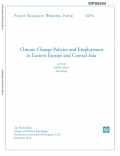Water sharing between Central Asian countries has been conflicting for quite a long time already.
Climate change policies and employment in Eastern Europe and Central Asia
This paper analyzes the differential impact of climate change policies on employment in Eastern Europe and Central Asia. In particular, the paper examines (i) how vulnerable labor markets are in Eastern European and Central Asian countries to future carbon regulation, and (ii) what countries can do to mitigate some of the potential negative effects of these regulatory changes on employment. In many aspects, the nature of the shock associated with climate regulation is similar to that associated with an increase in energy prices. Constraints on carbon emissions put a price on climate-damaging activities and make hydrocarbon-based energy production and consumption more expensive. As a result, firms in energy-intensive industries may react to higher energy prices by reducing production, which in turn would lead to lower employment. In the presence of frictions in labor markets, these sector shifts will cause resources to be unemployed, at least in the short term. Using principal component analysis, the paper finds that Eastern European and Central Asian countries vary greatly in their vulnerability and adaptability of employment to carbon regulation. Since the economy takes time to adjust, policy-makers will need to ensure that the incentives are there for new firms to emerge and employ workers, and that workers have the skills to respond to that demand. Moreover, governments have a role to play in ensuring that workers that are displaced have a proper safety net that will not only help in protecting their welfare, but will also allow workers to make more efficient labor market transitions.





